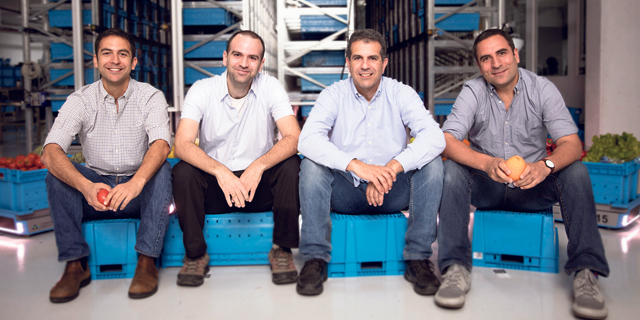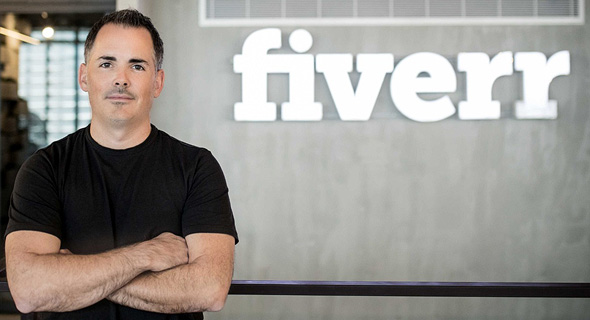
11 Israeli-founded startups named Covid Disrupters by the New York–Israel Business Alliance
Guided by data, it monitors economic development activity and trends in the public and private sectors to identify bilateral business growth potential.
The New York–Israel Business Alliance announced on Tuesday its list of “Covid Disrupters,” 11 Israeli-founded companies in New York that have the potential to apply game-changing solutions to major challenges posed by the coronavirus. “When we began this study, we expected to identify companies providing medical solutions,” said NYIBA president Aaron Kaplowitz. “But the fact of the matter is that the coronavirus has upended many industries and only one of the 11 disrupters brings a solution directly related to healthcare.”
The NYIBA team reviewed publicly available reports and records of the 506 Israel-founded businesses across New York State, analyzed emerging trends, and conducted dozens of interviews with company executives, government officials, investors, and industry analysts. From the outset, the NYIBA established a 100-point system that scored companies on Industry Disruptability, New Innovation, Covid-19 Solution, Staying Power, and External Feedback. “In a matter of months, we’ve dramatically modified our behaviors in order to cope with the impact that Covid-19 is having on our lives,” NYIBA president Aaron Kaplowitz said. “The rapid change has precipitated a technological transformation and created unanticipated opportunities for these companies to solve some of the thorniest challenges imposed by the pandemic and beyond.” NYIMBA’s goal is to create economic opportunities between New York State and Israel. Guided by data, it monitors economic development activity and trends in the public and private sectors to identify bilateral business growth potential. The Alliance hosts information seminars, organizes trade missions, and provides its members with funding notifications and investment opportunities Here are the 11 Covid Disrupters that received the highest scores by NYIBA analysts:Blue White Robotics
Blue White Robotics has developed a software platform system that enables users to manage an integrated network of autonomous vehicle fleets and robots from a single command center. Using BWR’s technology, farmers, for example, can deploy driverless tractors to spray their fields while seamlessly communicating with the aerial drones above that pollinate the crops. Although the platform has multi-sector applications, CEO Ben Alfi, who headed the Unmanned Aerial Systems and Special Devices unit of the Israeli Air Force, has focused on agriculture.
Earlier this year, New York State recruited the Tel Aviv-based company to open its U.S. headquarters in central New York, which has already facilitated collaboration with Syracuse-based Dropcopter to pollinate Israeli date farms and New York apple orchards. The coronavirus has also accelerated BWR’s expansion into other areas. The Israeli government tapped the start-up to work on pilot projects with Sheba Medical Center to ferry Covid-19 patients through the campus in autonomous shuttles and with the Netanya Geriatric Medical Center to provide aerial delivery of medical supplies.Carbyne
Carbyne offers a suite of solutions to equip law enforcement agencies with dynamic tools to safeguard their communities and bring greater operational efficiency to emergency responses. Merging location services, live video chat, incident mapping, and other communication technologies into a single dashboard, Carbyne provides more real-time information to police officers entering potentially chaotic and stressful encounters.
Carbyne, which moved its corporate headquarters from Tel Aviv to Manhattan in September 2019, has signed several county and city contracts, including in Colorado, Ohio, North Carolina, Minnesota, and Alabama. In March, as part of its effort to protect first responders from Covid-19 exposure, the City of New Orleans integrated Carbyne into its Emergency Communications Center. FabricFabric is a warehouse fulfillment company that aims to use robotics and location to disrupt e-commerce. Situated in urban areas, its micro fulfillment centers are serviced by proprietaryrobots that fetch items from shelves and transfer them to a fleet of floor robots that whisk product-filled baskets to processing and loading areas. Fabric is betting that the speed and efficiency of automation combined with the fulfillment centers’ proximity to customers will position the company to replace the same-day e-commerce delivery model with speedier two-hour delivery.
In September 2019, the company shed its tedious name – CommonSense Robotics – and moved its headquarters from Tel Aviv to New York City. In early 2020, Fabric began construction on its first U.S. micro-fulfillment center in Brooklyn, which will be followed by a center in Long Island City. In July, Fabric announced a partnership with FreshDirect that will introduce two-hour delivery to the Washington, D.C. metro area and expand cooperation with FreshDirect’s primary facility in the Bronx.Fiverr
According to a United Nations estimate, the number of working hours lost over the second quarter of 2020 is equivalent to 400-million full-time job losses. Those bleak numbers have driven more and more workers to the gig economy, where they’re connecting to cost-conscious companies seeking freelance services.
The basic supply and demand trend has accelerated growth for Fiverr, a marketplace platform for freelancers. Since March, when the coronavirus began to shutter offices, Fiverr’s stock has more than quadrupled. In its second quarter earnings report the publicly-traded company continued its accelerated march toward profitability: In 2020, the company expects to generate between $177.5 and 179.5 million in revenue, further solidifying its prominent role in the job market.
HyroA start-up that spun out of the Johnson Cornell Tech MBA program on Roosevelt Island, Hyro brings AI-powered conversational interface to websites and platforms. After securing Weill Cornell Medicine as its first institutional client, Hyro was able to master a healthcare solution that would prove critical when Covid-19 concerns began to overwhelm hospital call centers. Hyro deployed a Covid-19 virtual assistant that it supplied free of charge to medical institutions, connecting concerned citizens with an AI FAQ bot to determine if they require additional medical attention.
Hyro provided much-needed relief to the system and was able to gather medical data trends based on the keywords and queries submitted through its software. Its utility during the pandemic has accelerated Hyro’s expansion to medical institutions across the country. Meet in PlaceCoronavirus has roiled the commercial real estate market and companies are struggling to determine a safe and cost-effective way to transition employees back into office buildings. They’re also reassessing their long-term needs for office space. Tech companies such as Facebook, Twitter, and Square have already announced extended work-from-home plans, even beyond coronavirus. All the more so, for companies without their own campuses that require in-person gatherings, having on-demand access to meeting rooms and event spaces affords an attractive and flexible alternative to a full-time presence.
Founded in 2016 in Tel Aviv, Meet in Place today offers 36 high-end meeting rooms in the Financial District, Midtown, and SoHo. As more companies consider scaling down physical office space requirements, Meet in Place’s rentable boardroom supply could be the shared office model of the future.
Monday.comMonday.com is a cloud-based work operating system that brings intuitive functionalities to team management and task tracking. The platform helps groups customize workflow, communicate more effectively, and seamlessly integrate cross-functional teams of all sizes. With Covid-19 scattering employees to their respective homes, monday.com has quickly become the preferred platform for teams trying to maintain productivity, ensure accountability, and avoid communication breakdowns.
The company boasts more than 100,000 paying customers across the world and, according to Bloomberg, saw its valuation jump from $1.9 billion to $2.7 billion during the pandemic.
ObligoThe pandemic’s devastation on the economy has forced the federal government to find ways to put money back into Americans’ pockets. With roughly $50 billion worth of rental security deposits idling in escrow accounts in the United States, Obligo brings a credit-based alternative to security deposits that requires tenants to pay for damages only when they occur, consequently keeping more money circulating throughout the economy. Although Obligo’s solution helps fill an immediate need, co-founder brothers Roey and Omri Dor have a bigger-picture vision of not only helping tenants hold onto their money but also relieving landlords from the highly regulated – and burdensome – requirements involved in taking security deposits, which are often not needed.
Obligo’s Open Banking technology and AI-based underwriting allows the company to focus on advanced screening and collection technologies – similar to hotels that use credit to collect room deposits from guests.
RiskifiedRiskified helps online retailers safely approve more orders and increase revenue. The company estimates that 20 to 30 percent of legitimate customers are unable to complete their online transactions and get wrongfully declined due to leaks in the purchasing funnels, including bank declines and outdated merchant anti-fraud systems. Riskified’s AI platform solution detects fraud and authenticates shoppers, helping companies avoid losing revenue to fraud and lost sales.
Riskified pledges a 100 percent chargeback guarantee if a fraudulent transaction slips through its technology, which is trusted by merchants such as Gucci and Samsung. As Covid-19 drives more retail shopping online, the need to guarantee transactions has never been greater.
TytoCareTytoCare combines hardware and software to bring simple, high-quality telehealth visits into homes all over the world. The TytoHome is a palm-sized device that contains an LED screen, a digital thermometer, and a camera. The module connects to an array of medical accessories and instruments, which allow doctors to conduct remote medical exams that can include checking a patient’s temperature, ears, lungs, heart, throat, skin, and abdomen.
Recently awarded Extreme Tech Challenge’s top prize in the Covid-19 category, Tyto is the first commercially available self-administered audiovisual diagnostic system. Israeli hospitals have also been using TytoHome to remotely monitor lung function and fever of homebound Covid patients and even determine the safety of releasing them from quarantine. Beyond coronavirus, Tyto offers the ability to reduce in-person visits to doctor offices and afford patients anywhere in the world access to doctors.
VAST DataVAST Data brings high-performing and dependable AI technology to data storage. Its architecture reduces the power, space, and cooling requirements from data centers, thereby lowering costs and optimizing efficiencies. The result is a game-changing storage technology that paves the way for deep analytics on immense amounts of data, in real-time.
Scientists at the National Institute of Health, Harvard University, and Gingko Bioworks are using VAST Data’s technology to rapidly analyze massive data sets to research possible treatments for Covid-19. VAST Data assures the laboratories that storage won’t impede genome sequencing and experimentation, which can both require powerful computing capabilities. In April, as Covid-19 research in the United States surged, the company closed a $100 million funding round that bumped its valuation at $1.2 billion.







